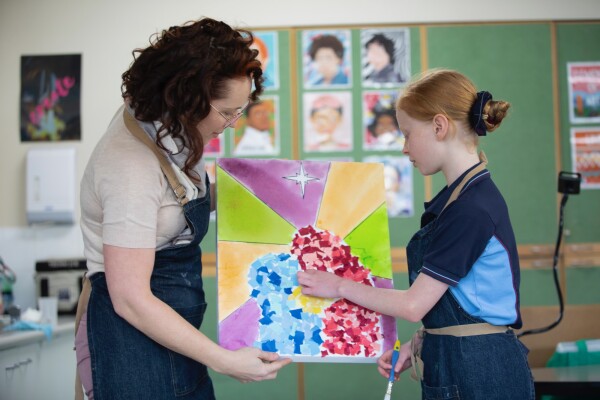
Ss Peter & Paul Kiama
A Catholic Parish Primary School
 Ss Peter and Paul participates in the 'Friendly Schools' Social Emotional Learning (SEL) Program.
Ss Peter and Paul participates in the 'Friendly Schools' Social Emotional Learning (SEL) Program.
The social, emotional, cognitive and physical aspects of a person’s development are interrelated. Each influences and is influenced by the others. Consequently, it is not uncommon for students who have difficulty managing their emotions and behaviour to face great challenges meeting the demands of schooling. This relationship between troubling behaviour and academic problems is not always clear in terms of which comes first, but what is clear is that the presence of one greatly increases the risk of the other.
For this reason, supporting students’ emotional, social and behavioural development through the 'Friendly Schools' whole-school approach enables them to more effectively engage in their learning.
Social and emotional learning is the process of developing and practising important social and emotional understandings and skills. These understandings and skills can be grouped into five key areas.
At Ss Peter and Paul, we believe to be empowered for the future students need to be equipped with well-developed social and emotional skills to manage themselves, relate to others, develop resilience and a sense of self-worth, resolve conflict, engage in teamwork and feel positive about themselves and the world around them. As such, the development of personal and social capability is a foundation for learning and for citizenship and commences from Kindergarten.
Improving social and emotional skills has a positive influence on children and adolescents’ attitudes, behaviours and performance. A review of 317 studies involving over 300 000 children and adolescents found that social and emotional learning programs were beneficial for children and young people both with and without behavioural or emotional problems. Social and emotional learning improved participants’ coping skills and resistance to negative peer pressure; resulted in more positive attitudes about themselves and others; improved social behaviours and cooperation with others; decreased risky, antisocial and aggressive behaviours; and decreased emotional problems.
Social and emotional learning programs like Friendly Schools can even improve academic success, with students demonstrating higher marks and better school attendance, as well as heightened trust and respect for teachers, improved management of school-related stress, and more participation in class.
These programs also show evidence of long-term effectiveness, especially if social skills are developed and consolidated across several years. Importantly, the positive effects of social and emotional learning can extend beyond the individual, with improvements in students’ social and emotional skills likely to have a positive influence on their peers, families and whole-school communities.